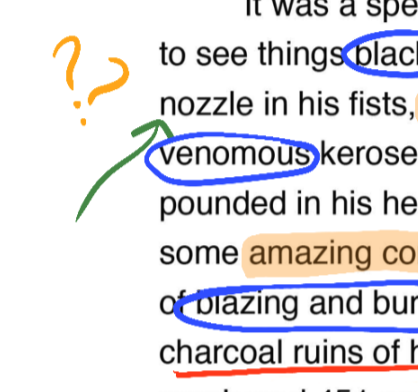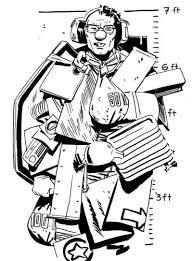
Students will understand the various forms of bankruptcy, how bankruptcy can occur, and alternatives to bankruptcy. This lesson includes optional modifications for distance learning. Resources for use in Google Classroom are included. Read more »
Standard 13: Bankruptcy
Grade Level
Subject
Course
Standards

Through their own research and discussion, students will see how career choice, postsecondary education, and salary are all interrelated. Students will identify three careers that they might be interested in, identify the postsecondary requirements to attain these careers, and learn what the beginning... Read more »
Standard 1: Earning an Income
Related
Grade Level
Subject
Course
Standards

Annotating a text allows students to process information about an author’s purpose and point of view. In this lesson, students will learn techniques for analyzing a text to create an argumentative paragraph related to an author’s style. This lesson may be adapted to fit any text with a particular style... Read more »
Style and Syntax
Grade Level
Subject
Course
Standards

Students will use text analysis strategies to summarize two significant events of the Revolutionary War - the Battle of Saratoga and the French Alliance. Then students, working in collaborative groups, will use their knowledge of these events to annotate the lyrics of the song "Guns and Ships" from... Read more »
Battle of Saratoga and the French Alliance
Subject
Course
Grade Level
Standards

Students explore the meaning and application of the Bill of Rights. Working in groups, students summarize each of the amendments in the Bill of Rights in their own words. Next, students practice using their knowledge of the Bill of Rights by determining which amendment could be applied in specific... Read more »
The Bill of Rights
Subject
Course
Grade Level
Standards

This lesson uses the book "P Is for Pterodactyl: The Worst Alphabet Book Ever" by Raj Haldar and Chris Carpenter to teach digraphs and nuances of phonetics in the English language. Students will brainstorm to identify other digraph words in their vocabularies, write and draw their own pages for a sequel... Read more »
Phonics
Grade Level
Subject
Standards

In this lesson, students become familiar with identifying, locating, and analyzing persuasive techniques in writing and multimodal compositions, including their own, by examining the ways in which commercials and infomercials employ these techniques. Using their new knowledge, students will write a... Read more »
Persuading Your Audience
Grade Level
Subject
Standards

In this lesson about perspectives in the Civil War, students will participate in a role-playing activity to become familiar with the motives and points of view of various key figures in the Civil War; analyze each figure in greater depth; participate in a close reading and annotation activity involving... Read more »
Perspectives in The Civil War
Subject
Course
Grade Level
Standards

In this lesson about the Industrial Revolution, students will begin by observing photographs of factory workers and analyzing primary sources to make inferences about working conditions during the Industrial Revolution. Based on the information they gather, students will write a letter protesting working... Read more »
The Industrial Revolution
Related
Subject
Course
Grade Level
Standards

Systems of Equations
This lesson will teach students about solving systems of linear equations by focusing on variables that play a role in political campaign management. Students will experience the connection between algebra and careers through a virtual “Career Zoom” interview with a campaign manager, then create their... Read more »
Systems of Equations
Course
Subject
Standards

Setting and Conflict
In this lesson, students experiment with changing the settings in well-known fairy tales and examine how conflict might change in a different setting. Students explore the Prologue from Shakespeare's "Romeo and Juliet" and analyze how the setting affects the conflict. After analyzing and comparing different... Read more »
The main cause of the French Revolution is still debated by historians today. In this lesson, students will begin by activating prior knowledge as they complete a Tell Me Everything activity on revolutions. They will sort conditions in a society that can lead to revolution into categories of political,... Read more »
Exploring Causes of the French Revolution
Subject
Course
Grade Level
Standards

This lesson is based on the short story "The Lady, or the Tiger?" by Frank R. Stockton. Students will summarize the story and analyze each character's personality and internal conflict. Students will also identify the external conflict through the plot and setting. The author does not provide an ending... Read more »
Internal & External Conflict
Subject
Course
Grade Level
Standards

Students will read and view different portrayals of the lotus eaters, inspired by Greek mythology and classical literature. Students will compare and contrast the selections, then put themselves in the position of the sailors and determine whether they would succumb to temptation. Read more »
Exploring Temptation Through the Lotus Eaters
Subject
Course
Grade Level
Standards

In this lesson, students explore the idea of superstitions and ghost stories and how they affect people and their emotions and behaviors. Students read “The Legend of Sleepy Hollow” by Washington Irving and examine how the two main characters react to and are affected by the legend of the headless... Read more »
Characters' Differing Perspectives
Subject
Course
Grade Level
Standards

Students will watch videos to learn about firsthand accounts of ghost encounters and decide whether these stories are believable. Students will then read "The Legend of Sleepy Hollow" and examine if and how Brom's story of the Headless Horseman was credible. Students will conclude the lesson by creating... Read more »
Credibility and The Legend of Sleepy Hollow
Subject
Course
Grade Level
Standards

This lesson asks students to analyze the motivations of Montresor in Edgar Allen Poe's short story "The Cask of Amontillado" and engages students by placing them in the role of a forensic psychologist. In this role, having students will answer questions in a clinical evaluation. Students will analyze... Read more »
Irony and Characterization in "The Cask of Amontillado"
Related
Subject
Grade Level
Standards

In this lesson, students will learn about China’s Civil War from 1945-1949. Participating in a discussion about why people rebel against their governments, they will analyze an excerpt from an article about the life of peasants in China prior to the conflict under the Kuomintang rule and an article... Read more »
China's Civil War
Subject
Course
Grade Level
Standards

In this lesson, students will examine the facts associated with evolution, infer what fossilized remains can inform us about an organism, explore how evolution is influenced by an ever-changing environment, and construct a timeline of an organism change resulting from environmental factors or human... Read more »
Biology
Subject
Course
Grade Level
Standards

Do words matter? Does our choice of words affect the attitudes of others? In this lesson, students will explore the denotation and connotation of different words from Romeo and Juliet and how word choice affects understanding and perception of an author’s writing. This is a multimodality lesson, which... Read more »
Connotation and Denotation in Romeo and Juliet
Subject
Grade Level
Standards

Setting and Conflict
In this lesson, students will experiment with changing the setting in well-known fairy tales and will examine how the conflict would shift in the new setting. Students will explore the Prologue in Romeo and Juliet and analyze how the setting affects the conflict. Finally, students will rewrite their... Read more »

Setting and Conflict
In this lesson, students will experiment with changing the setting in well-known fairy tales and will examine how the conflict would shift in the new setting. Students will explore the Prologue in Romeo and Juliet and analyze how the setting affects the conflict. Finally, students will rewrite their... Read more »

Do words matter? Does our choice of words affect the attitudes of others? In this lesson, students will explore the denotation and connotation of different words and how word choice affects understanding and perception of an author’s writing. This lesson is multi-modal, which means it's intended to... Read more »
Connotation and Denotation
Subject
Grade Level
Standards

Setting and Conflict
In this lesson, students will experiment with changing the setting in well-known fairy tales and will examine how the conflict would shift in the new setting. Students will explore the Prologue in Romeo and Juliet and analyze how the setting affects the conflict. Finally, students will rewrite their... Read more »

This lesson is part of a series, titled "Woman Crush Wednesday," where we look at how female scientists have shaped our views of science. In this biology lesson, students explore the contributions of Nettie Stevens and her discovery of sex chromosomes. Read more »
Inheritance and Variation of Traits
Subject
Course
Grade Level
Standards

Equality, Fairness, and the Amendments
Students will read and analyze the short story, "Harrison Bergeron," by American writer Kurt Vonnegut. Students will consider how the amendments to the constitution promote equality. They will discuss different claims, which support the amendments, and discuss evidence or lack of evidence to explain... Read more »
Equality, Fairness, and the Amendments
Standards

Truth is a powerful thing. Sometimes it hurts, and sometimes it is hard to deliver. In this multi-genre lesson, students will analyze and compare three texts written on the subject of honesty. Students will determine the claim a text is arguing and the evidence and reasoning that is used to support... Read more »
Claim, Evidence, Reasoning
Grade Level
Subject
Standards

In this lesson, students learn about the way trade affects the spread of religion by studying the contributions of Mansa Musa to the culture of West Africa. Students examine the empire that Mansa Musa led by viewing images related to Mansa Musa’s contributions, viewing a video, and reading an article... Read more »
Trade and Religion in West Africa
Grade Level
Subject
Course
Standards

Historical and Cultural Perspectives in Literature
Grade Level
In this lesson, students evaluate the historical and cultural perspectives behind spoken word poetry. Students review several spoken word poems and analyze their historical, cultural, and social connections while studying the history of spoken word poetry. Students then demonstrate and justify their... Read more »
Historical and Cultural Perspectives in Literature
Grade Level
Subject
Standards

In this lesson, students will explore the meaning of the word "parallel" and analyze how and for what purposes parallel structure is used in speeches. At the end of the lesson, students will compose a tweet to summarize the purpose of parallel structure in writing. This lesson includes optional modifications... Read more »
Parallel Structure
Subject
Grade Level
Standards

This lesson focuses on engaging students to understand how their academic coursework connects to and affects their futures. Students reflect on their current level of academic performance, learn about the PreACT, take the PreACT, play the game Get a Life!, review and understand their PreACT scores,... Read more »
Connecting Coursework to Future Goals in College and Career
Related
Course
Subject
Grade Level

This lesson takes learners through a process using their five senses to describe various candies. Learners will record their findings using descriptive words and then pose positive or negative opinions about the candies. Following this activity, they will write the first draft of a persuasive paragraph... Read more »
Persuasive Writing
Subject
Course
Grade Level
Standards
In this lesson, students examine how the author uses symbolism to develop characterization and theme in Part One of To Kill a Mockingbird. Students specifically examine human nature through readings, a Four Corners activity, and a Flipgrid reflection. Read more »

Be ready to move! Classroom practices that engage and maintain student interest while promoting student-centered learning and real-world connections are highlighted in this presentation. Participants will use Flipgrid technology to understand how students can communicate their learning in a new and... Read more »
Target Audience
Calendar Placement
Group Size
Intention Or Purpose

Failure is not easy as we go through it, but it can be an important learning opportunity with the right perspective. By approaching these moments with a positive mental attitude, it is possible for someone to take these moments of failure and turn them into the foundation for later success. Read more »
Target Audience
Calendar Placement
Group Size
Intention Or Purpose

Students will listen to an engaging speech and record their thoughts. Students will then choose a topic of their interest and write down all they know about the topic in a two-minute paper. Students will learn more about preparing a speech and discuss their learning with their peers. They will create... Read more »
Calendar Placement
Group Size
Intention Or Purpose
College & Career Readiness Framework
Related

